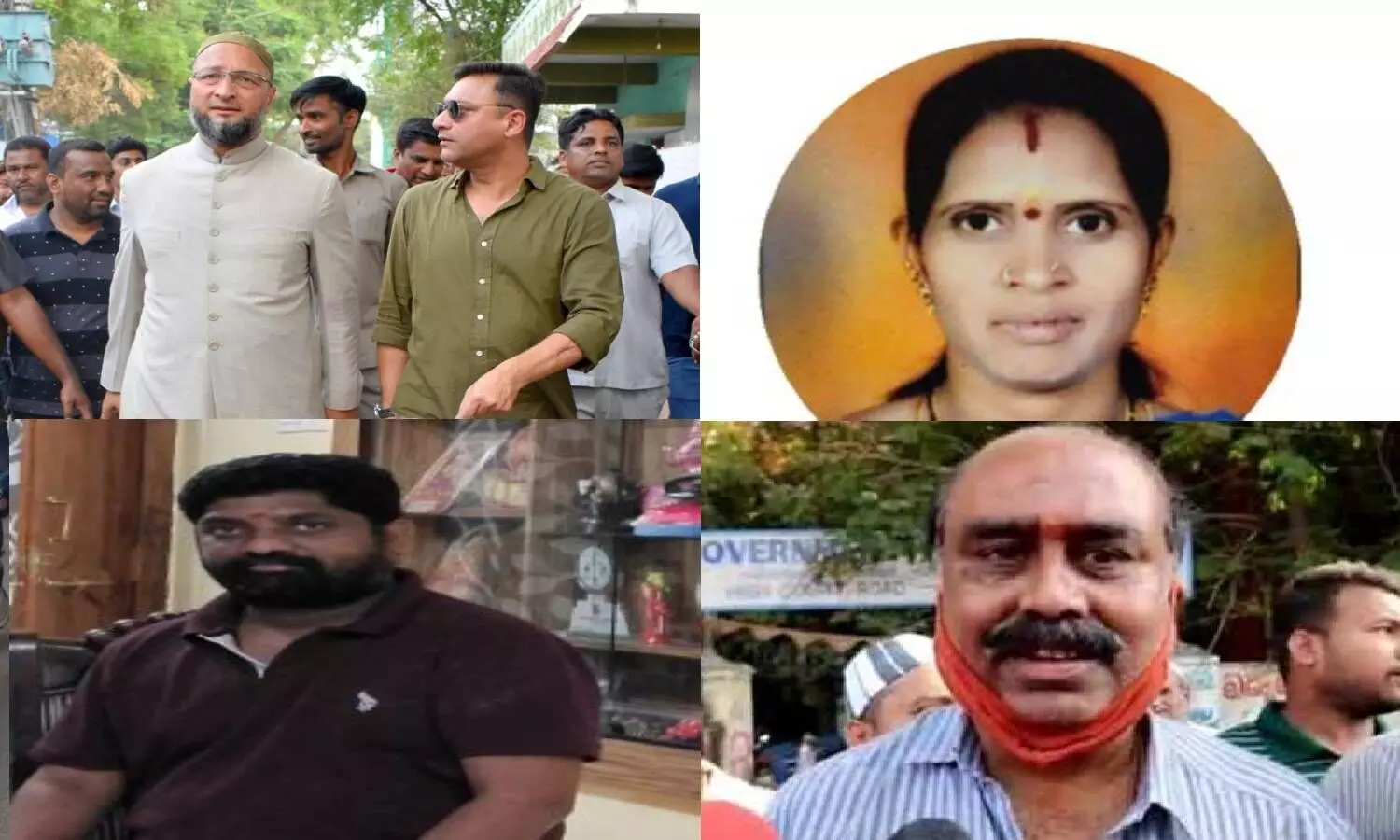GHMC Polls: 3 Hindu candidates won on AIMIM ticket
Myth, after all, remains the never-ending story. The popular perception among people is that the Majlis is a Hyderabad-based and Muslim-alone party. Nothing can be farther from the truth.
By J.S. Ifthekhar
Hyderabad: By now it's an established fact. Nobody can dare the Majlis-e-Ittehadul Muslimeen (MIM) in its den. The recent GHMC polls have reinforced the near invincibility of the party yet again. Another factor the results have underlined is that voters in the Old City plump for the party - not the candidates. Anyone, irrespective of religion and caste, can have a cakewalk at the hustings if they contest on the Majlis ticket.
This time round the Majlis romped home from 44 divisions, a repeat of its 2016 performance. And among the winners are K. Tara Bai (Falaknuma), S. Raj Mohan (Puranapul) and Mandagiri Swamy (Karwan). They are among the five non-Muslim candidates fielded by the Majlis this time. In the 2016 civic polls four Hindu candidates won on Majlis ticket - D. Mohan (Jambagh), Rajender Yadav (Karwan), Raj Mohan (Puranapul), and Tara Bai (Falaknuma). In fact in the previous election, Majlis president, Asaduddin Owaisi, celebrated the win of Raj Mohan by tweeting, "Hindu candidate of MIM wins over Muslim candidate of Congress".
Myth, after all, remains the never-ending story. The popular perception among people is that the Majlis is a Hyderabad-based and Muslim-alone party. Nothing can be farther from the truth. In the last few years, the party has spread out of its traditional stronghold to contest both the local body and Assembly polls in Telangana, Seemandhra, Maharashtra, and UP. The party's performance in the Bihar Assembly polls is by far the best outside Hyderabad. The Majlis bagged five Assembly seats of Seemanchal with a comfortable majority. Flush with success the party has now set its eyes on West Bengal. Majlis successes outside its bastion have raised the eyebrows of other parties and earned Mr. Owaisi the sobriquet of 'vote cutter'. But unfazed Mr. Owaisi is bent on expanding his party footprints across the country. "Irrespective of whether we win or not we will contest", says the Majlis leader.
Efforts to widen the party base began in the early 1980s when the late Sultan Salahuddin Owaisi sought to spread his party's influence in several Telangana and Rayalaseema towns where the Muslim population was sizable. However, the party struck gold when his son, Asaduddin Owaisi, took over the mantle.
For quite some time now Mr. Asaduddin Owaisi is playing the Dalit card to the hilt. He feels the Dalit-Muslim unity will result in a win-win situation for both the marginalized communities. "Empowerment of Dalit-Muslim is the need of the hour as both the groups are socially, educationally and economically backward", he keeps harping in election after election.
This is no empty slogan. The Majlis has, in fact, walked the talk. The party nominated three Dalits as Mayors and two as Deputy Mayors. K. Prakash Rao was the first Dalit Mayor from Majlis in 1986-87 followed by A. Satyanaryana (1988-89) and Allampally Pochiah (1990-91). The two non-Muslim Deputy Mayors were M.B. Shivraj (1987-88) and Hanmanthu (1989-90). Over the years the Majlis has kept fielding Hindu candidates in Assembly and local body elections. Other political parties that flaunt the 'secular' card find it hard to beat this record.
While the bifurcation of Andhra Pradesh impacted many parties, the Majlis not only held its own but went on to reap electoral gains beyond its bastion. The party won 101 wards in Telangana and five in the Seemandhra region. The winners included six non-Muslims and 38 women candidates. In the Panchayat Raj elections held in 2014, the party bagged 21 posts of Mandal Parishad Territorial Constituency (MPTC) members. The Majlis put up a spectacular performance in the 2014 Assembly election, securing a vote share of 3.7 percent. This helped the party gain recognition from the Election Commission of India as a State party in Telangana with 'kite' as its reserved symbol. The Majlis dream run continued with the party wresting two Assembly seats of Aurangabad Central and Byculla in Mumbai in the Maharashtra Assembly elections held in 2014. The party repeated its good performance the following year in the Maharashtra civic polls by winning 26 seats in the Aurangabad Municipal Corporation. Five of the 13 ST candidates it fielded won, creating a rare Dalit-Muslim social coalition. In the 2019 Assembly elections in Maharashtra, the party won from Malegaon Central and Dhule City.
Why do non-Muslim candidates root for Majlis? The style of functioning of Mr. Owaisi and his team is the reason, many feel. Once the electoral heat is over, the Majlis leaders settle down to work at Darussalam, the party headquarters. Right from the Hyderabad MP to MLAs, MLCs and Corporators - all are available every day for the people to meet. No prior appointment is required. People just walk in and represent their problems. "This is the reason why our party clicks with everyone. Moreover, we believe in working with all", says Majlis MLC, Syed Aminul Hasan Jafri.